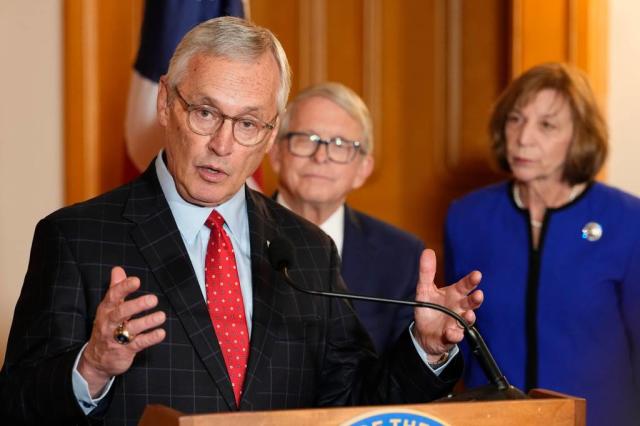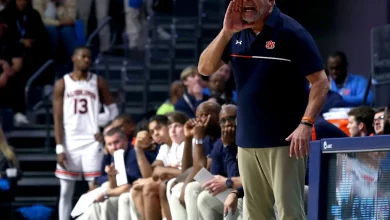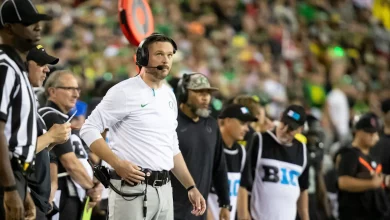Given that college football has moved past “Tattoogate,” is Jim Tressel a viable candidate for governor of Ohio?

Is Jim Tressel a Viable Candidate for Governor of Ohio in 2025?
As the state of Ohio approaches a pivotal election cycle in 2025, the question of who could fill the shoes of the next governor is stirring conversation. One name that has emerged in recent political discussions is Jim Tressel, the former head coach of the Ohio State Buckeyes football team. Tressel, who became an iconic figure in Ohio sports due to his unparalleled success on the football field, has long had a significant influence in the state. While Tressel’s legacy in the sports world is unquestionable, the question remains: can the former football coach successfully transition to a political career? And, more importantly, could he make a viable run for the office of governor of Ohio?
Tressel’s path from sports to politics is not unique in the broader context of American political history. Many former athletes and coaches have made similar transitions, with some achieving notable success. However, the nature of Tressel’s career, particularly the scandal surrounding Tattoogate, introduces a layer of complexity to his potential candidacy. The political climate in Ohio, as well as Tressel’s own personal and professional evolution since his time at Ohio State, will play critical roles in determining whether or not he can be a legitimate contender for the state’s highest office.
The Jim Tressel Legacy: A Winning Culture in Ohio
Jim Tressel’s legacy as the head coach of the Ohio State football team is both impressive and enduring. Tressel led the Buckeyes from 2001 to 2010, during which he established himself as one of the most successful and respected coaches in college football history. Under Tressel, Ohio State won the 2002 BCS National Championship, three Big Ten Championships, and was a perennial contender in both the Big Ten and national title races. The 2002 title, in particular, is etched in Ohio State lore as one of the program’s defining moments.
Tressel’s ability to connect with his players, build a strong team culture, and lead Ohio State to sustained success earned him the nickname “The Senator” among fans and media. His leadership skills and his knack for motivating his teams to perform on the biggest stages were hallmarks of his coaching style. More than just a football coach, Tressel became a beloved public figure in Ohio. He embodied the values of hard work, integrity, and discipline that resonate deeply with many Ohioans.
However, it was his involvement in the Tattoogate scandal, which led to his resignation in 2011, that would challenge Tressel’s reputation and complicate his post-coaching career. The scandal centered around several of Tressel’s players, including star quarterback Terrelle Pryor, who were found to have traded memorabilia for tattoos and other benefits, which violated NCAA rules. Tressel, who initially failed to report the violations, faced severe scrutiny and was forced to step down as head coach.
The Tattoogate scandal remains a blemish on Tressel’s otherwise stellar coaching career, but it also represents a pivotal moment in his life, forcing him to confront the consequences of his actions and rebuild his public image. Tressel’s journey since then—serving as president at Youngstown State University, his work in education, and his philanthropic efforts—has positioned him as a respected leader in Ohio, even as his coaching legacy remained tainted by the scandal.
The Ohio Political Landscape: A Shifting Climate
Ohio is a state with a complex political landscape, one that has swung back and forth between Democratic and Republican control in recent years. The 2025 election for governor comes at a time of heightened political polarization, economic challenges, and public dissatisfaction with traditional political figures. Amid this climate, there could be an appetite for an outsider, someone who is seen as trustworthy, non-partisan, and capable of uniting the state’s often divided electorate.
Tressel, as a figure largely associated with the Ohio State Buckeyes, holds a strong connection to the state’s football culture—a connection that could serve him well in building a coalition of supporters. For many Ohioans, Tressel’s era as head coach is one of the brightest periods in the state’s recent history. His deep ties to Ohio, particularly his decades of work with students, athletes, and communities, provide a unique platform for a gubernatorial run. In an era where voters are often disillusioned by career politicians, Tressel could be seen as a fresh face with a reputation built on leadership, integrity, and a commitment to the state.
Additionally, Tressel’s post-coaching career has seen him take on significant roles in higher education and community service. As president of Youngstown State University, Tressel led the university through difficult financial times, focusing on improving the school’s image and securing its financial future. His work in education and his emphasis on the importance of academic success, community development, and local job creation might resonate with Ohioans who are seeking a leader with practical experience in both governance and community-building.
However, Tressel’s transition from a beloved coach to a serious political contender would not be without its challenges. Despite his popularity, Tressel is not without his critics, and the Tattoogate scandal still lingers in the minds of some voters. While it could be argued that his fall from grace was due to the actions of his players, rather than his own conduct, there are those who may view Tressel’s resignation as an indication of a lack of accountability and leadership under pressure. For some, his time at Ohio State will always be viewed with skepticism, and this could pose a significant hurdle if Tressel were to enter the political arena.
Tressel’s Potential for Political Success: The Road Ahead
For Jim Tressel to run for governor of Ohio in 2025, there are several key factors that would influence his viability as a candidate. First, he would need to build a strong political infrastructure, which includes fundraising, assembling a campaign team, and establishing his platform. Ohio is a battleground state, and any candidate who hopes to succeed will need to have a clear and compelling vision for the future of the state. Tressel’s experience in higher education, his advocacy for youth development, and his work in public service could form the foundation of his platform, with a particular focus on issues such as education, workforce development, and fiscal responsibility.
Moreover, Tressel would need to engage with a diverse array of voters. While his connection to Ohio State football would certainly give him a strong base of support among Buckeye fans, he would need to expand his appeal beyond the football field to connect with rural voters, urban dwellers, and the working-class citizens who make up much of Ohio’s electorate. A gubernatorial campaign would require Tressel to be skilled in political messaging, public speaking, and navigating complex policy issues—skills that may not come naturally to someone whose experience is primarily in sports and education.
Another consideration would be how Tressel addresses his past. While the Tattoogate scandal is a blemish on his record, it is also an opportunity for Tressel to demonstrate growth and maturity. A successful political candidate must show humility, acknowledge past mistakes, and present a vision for a better future. Tressel’s ability to do this, combined with his experience in overcoming challenges, could prove to be an asset in his political career.
Tressel’s political ideology, too, would play a major role in his appeal. As someone who has worked in both the public and private sectors, he could potentially bridge the divide between conservatives and liberals, focusing on pragmatic, commonsense solutions that would benefit Ohio’s economy and its residents. His leadership style, which emphasizes teamwork, discipline, and integrity, could resonate with voters looking for a leader who can unify the state and tackle its most pressing issues.









